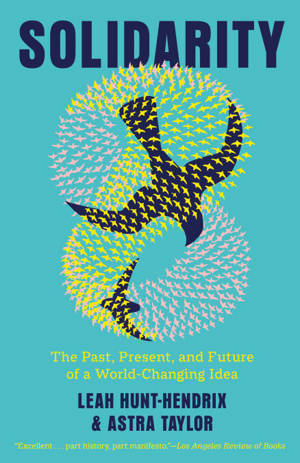
Je cadeautjes zeker op tijd in huis hebben voor de feestdagen? Kom langs in onze winkels en vind het perfecte geschenk!
- Afhalen na 1 uur in een winkel met voorraad
- Gratis thuislevering in België vanaf € 30
- Ruim aanbod met 7 miljoen producten
Je cadeautjes zeker op tijd in huis hebben voor de feestdagen? Kom langs in onze winkels en vind het perfecte geschenk!
- Afhalen na 1 uur in een winkel met voorraad
- Gratis thuislevering in België vanaf € 30
- Ruim aanbod met 7 miljoen producten
Zoeken
Solidarity E-BOOK
The Past, Present, and Future of a World-Changing Idea
Leah Hunt-Hendrix, Astra Taylor
E-book | Engels
€ 8,09
+ 8 punten
Omschrijving
A VULTURE BEST BOOK • From renowned organizers and activists Leah Hunt-Hendrix and Astra Taylor, comes the first in-depth examination of Solidarity—not just as a rallying cry, but as potent political movement with potential to effect lasting change.
A DAYTON LITERARY PEACE PRIZE FINALIST
“A window into what is possible when we reject the politics of division, trade individualism for interconnectedness and prioritize coming together for the greater good.”—Heather McGhee, author of The Sum of Us: What Racism Costs Everyone
"Reads at once like a moral treatise and a rallying manifesto, a call to reflect and lock arms.”—The Washington Post
Solidarity is often invoked, but it is rarely analyzed and poorly understood. Here, two leading activists and thinkers survey the past, present, and future of the concept across borders of nation, identity, and class to ask: how can we build solidarity in an era of staggering inequality, polarization, violence, and ecological catastrophe? Offering a lively and lucid history of the idea—from Ancient Rome through the first European and American socialists and labor organizers, to twenty-first century social movements like Occupy Wall Street and Black Lives Matter—Hunt-Hendrix and Taylor trace the philosophical debates and political struggles that have shaped the modern world.
Looking forward, they argue that a clear understanding of how solidarity is built and sustained, and an awareness of how it has been suppressed, is essential to warding off the many crises of our present: right-wing backlash, irreversible climate damage, widespread alienation, loneliness, and despair. Hunt-Hendrix and Taylor insist that solidarity is both a principle and a practice, one that must be cultivated and institutionalized, so that care for the common good becomes the central aim of politics and social life.
A DAYTON LITERARY PEACE PRIZE FINALIST
“A window into what is possible when we reject the politics of division, trade individualism for interconnectedness and prioritize coming together for the greater good.”—Heather McGhee, author of The Sum of Us: What Racism Costs Everyone
"Reads at once like a moral treatise and a rallying manifesto, a call to reflect and lock arms.”—The Washington Post
Solidarity is often invoked, but it is rarely analyzed and poorly understood. Here, two leading activists and thinkers survey the past, present, and future of the concept across borders of nation, identity, and class to ask: how can we build solidarity in an era of staggering inequality, polarization, violence, and ecological catastrophe? Offering a lively and lucid history of the idea—from Ancient Rome through the first European and American socialists and labor organizers, to twenty-first century social movements like Occupy Wall Street and Black Lives Matter—Hunt-Hendrix and Taylor trace the philosophical debates and political struggles that have shaped the modern world.
Looking forward, they argue that a clear understanding of how solidarity is built and sustained, and an awareness of how it has been suppressed, is essential to warding off the many crises of our present: right-wing backlash, irreversible climate damage, widespread alienation, loneliness, and despair. Hunt-Hendrix and Taylor insist that solidarity is both a principle and a practice, one that must be cultivated and institutionalized, so that care for the common good becomes the central aim of politics and social life.
Specificaties
Betrokkenen
- Auteur(s):
- Uitgeverij:
Inhoud
- Aantal bladzijden:
- 432
- Taal:
- Engels
Eigenschappen
- Productcode (EAN):
- 9780593701256
- Verschijningsdatum:
- 11/03/2024
- Uitvoering:
- E-book
- Beveiligd met:
- Adobe DRM
- Formaat:
- ePub

Alleen bij Standaard Boekhandel
+ 8 punten op je klantenkaart van Standaard Boekhandel
Beoordelingen
We publiceren alleen reviews die voldoen aan de voorwaarden voor reviews. Bekijk onze voorwaarden voor reviews.









